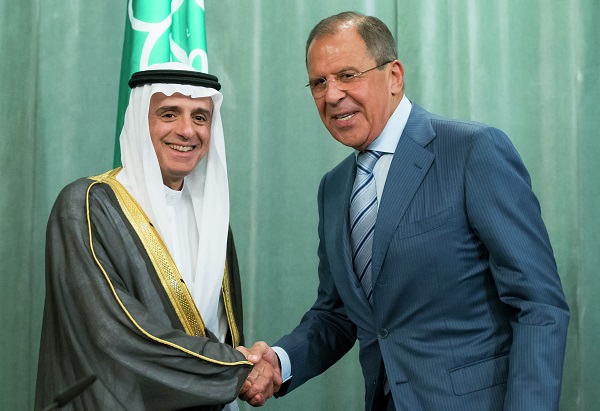
RNA - The trip also saw the Russian FM meeting the Saudi King Salman bin Abdulaziz who is scheduled to visit Moscow in October to be the first Saudi monarch to visit Russia since the two countries established their diplomatic relations in 1991.
At the end of Lavrov trip, the differences on such cases as Syria's conflict and Qatar's diplomatic row between the two sides were undeniably noticeable. Riyadh closeness to Moscow and Russian welcome to the Saudis, however, raise a need to bring in spotlight the objectives of exchange of visits between the two countries' officials.
Russian drive behind relations boost with the kingdom
The current regional issues found their way to high significance in the recent visit to Saudi Arabia of the Russian FM, but it appears that more important thing is that Moscow seeks to use the West Asia region’s crises to build a position for itself similar to those of the US and Europe in the Arab world and the region as a whole.
The Lebanese political analyst Ghaleb Ghandil suggests that Russia is now strengthening its contacts with the key actors in the region.
“Lavrov visit of Saudi Arabia comes as part of the Russian intention to settle the armed conflicts in the Near East”, the Lebanese analyst said.
According to Ghandil, a look at the Syrian conflict gives the idea that Moscow’s stances have always been challenged by the US and other allied Western countries, along with their regional ally Saudi Arabia. But the recent developments make them look at the issue afresh. After all, the Saudi-backed terrorists can no longer take on the now-stronger Syrian army. This weakness of the opposite sides gives the Russians a scope to seize the chance and more strongly seek influence in the Arab world, most importantly in Saudi Arabia.
Two factors remarkably help Moscow with this end: First, the US frail performance in the Muslim world events especially after 2010. This was marked by Washington’s leaving alone its regional allies in sensitive conditions and in some cases working against them. For example, following the failed coup attempt in Turkey in July 2016, the Turkish leaders directly accused the West, and especially the US, of supporting the coup plotters. Yes, the blame of the West came from Ankara, the key fueler of the Syrian conflict and the strategic ally to the US and Saudi Arabia in their unceasing efforts to check the game-changing political and military victories of the Axis of Resistance in the Syrian battlefield.
Having this US background in mind, Saudi Arabia can never be assured that Washington will not deal it fatal blows if the US national interests in the region necessitate it. This lack of assurance is even doubled as Riyadh knows well that under President Donald Trump the US view of the Arab allies is utterly economic and profit-seeking.
Second, at the present time, the strategic partnership of the US and Europe has shrunken to its lowest level. The Saudi rulers know it perfectly that the US and the EU are deeply divided on the Iranian nuclear program and deal reached in July 2015 as well as the risks and possibility of return of the Western extremist fighters from the Syrian battlefields to Europe. In fact, under the present conditions of the Muslim world, the US and the EU may share the objectives but are far from taking the same track as they did during the Second Persian Gulf War in which they joined forces and invaded Iraq. These all make Saudi rulers come up with the notion that in the shadow of the regional US influence decline recognizing the Russian power helps the kingdom improve its bargaining capabilities in the face of the West and the US.
Saudi reasons for closeness to Russia
Three main reasons drive Saudi Arabia closer to Russia: First, Riyadh struggles to restore its lost regional power. As the times goes by, it becomes clearer that Saudi Arabia is the marked loser of the regional developments. The Arab monarchy lost the Turkish ally's support after the coup that sought to bring down Turkey's President Recep Tayyip Erdogan. Moreover, both the Iraqi government and people label Saudi Arabia as the main culprit behind ISIS rise in their country and the resultant damages. Yemen, the country that once was Saudi Arabian backyard, has now slipped out of the Riyadh control, and even worse become a quagmire where Saudis immerse deeper day by day as the war unfolds. Pakistan is very pragmatic in its dealing with Saudi Arabia’s demands. And in Syria, where the oil-rich monarchy worked hard to topple President Basher al-Assad, the government not only survived collapse but also made triumphant gains politically and militarily. And more importantly, Qatar moved out of the Saudi-led regional orbit and tended to other regional powers. With proximity to Moscow, Riyadh might want to announce, though unofficially, its policy shift and review of way of treating the above-mentioned countries.
Second, Saudi Arabia works diligently to stop further gains by the Iran-led Resistance camp using the Russian clout in the region. Recent triumphs against ISIS terrorists in Syria and Iraq have set off alarm bells to the Arab monarchy. Losses of this size and the sight of more to come persuade Riyadh to make economic and political concessions to Moscow to slow the pace of the Resistance camp’s successes in Syria.
And third, the closeness to Moscow is forced by severe concerns of Riyadh about deepened Russo-Iranian cooperation in West Asia. Mustafa al-Ani, the fellow at the Middle East Security Program, Royal United Services Institute for Defense and Security Studies (RUSI), maintained “The Saudis have now figured out that the Russians can be the only partner capable of settling the Syrian crisis.” He further noted “Another motivation for them (Saudis) to move close to Russia is their will to curb Iran’s growing power gain.”
847/940